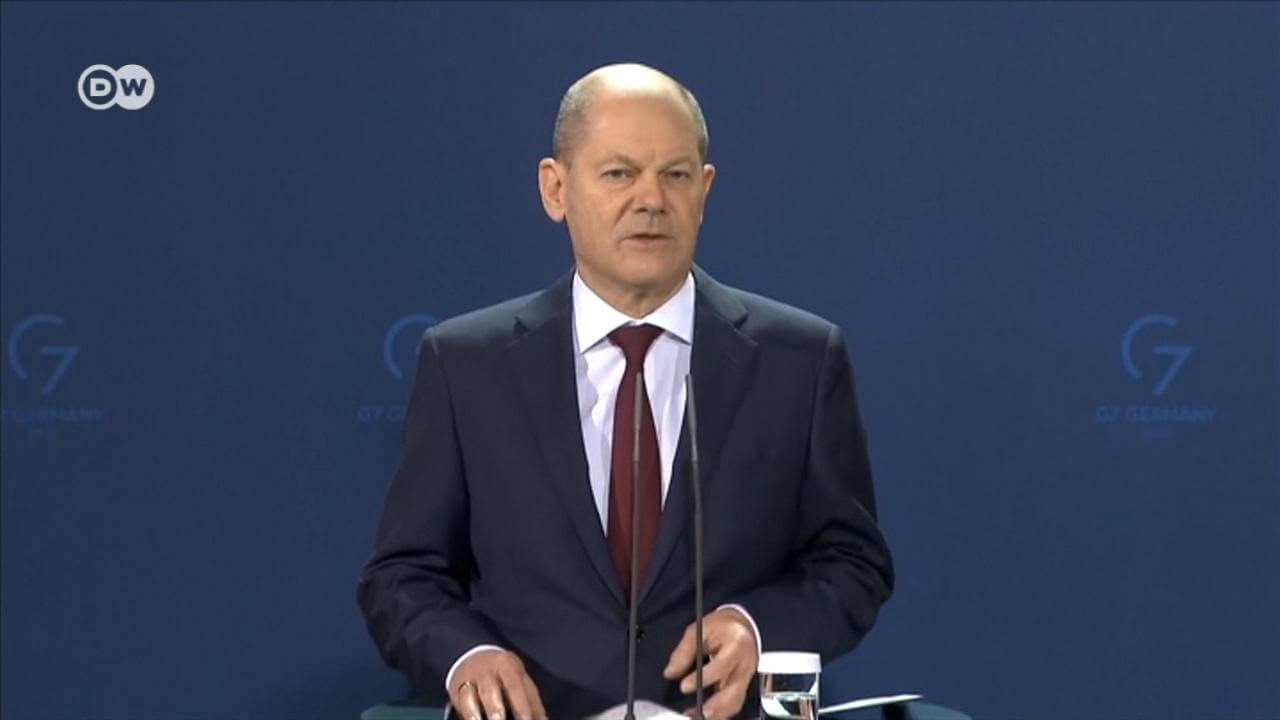On Monday, German Chancellor Olaf Scholz reaffirmed his support for Ukraine amid heightened tensions between Russia and Ukraine.
Following his meeting with Ukrainian President Vodolymyr Zelensky in Kyiv, Scholz said, “Germany stands close by your side. My country is impressed by the democratic movement in Ukraine and supports the European path it has taken since 2014.”
These are very serious times in which I am visiting #Ukraine. It was very important to me here in Kiev to make it clear during my talks with President #Selensky: Germany stands closely alongside Ukraine and supports it on the European path! (1/2)
— Bundeskanzler Olaf Scholz (@Bundeskanzler) February 14, 2022
Additionally, Scholz highlighted the large amounts of financial aid given to Ukraine to ward off Russian aggression and foreign influences, and also announced an additional loan of $170 million to Kyiv. However, Scholz remained firm on not sending lethal weapons to Kyiv despite the increasing threat of a Russian invasion.
Germany has been criticised for its mild stance, characterised by its failure to include the shutting down of Russia’s ambitious Nord Stream 2 pipeline if it invades Ukraine as part of the sanctions package against Moscow. Therefore, Germany’s refusal to deliver lethal weapons to Ukraine has only led to further condemnation. DW’s Kyiv correspondent, Nick Connolly, said, “With no sign for now that Germany is prepared to give any ground either on weapons or on Nord Stream 2, Olaf Scholz has his work cut out convincing his Ukrainian hosts that he has their interests at heart and that they can trust him to negotiate a way out of this crisis when he goes to Moscow.”
Meanwhile, the first contingent of 70 German troops arrived in Kaunas, Lithuania on Monday. More arrivals are expected throughout the week. Last week, the German Defence Ministry announced plans to send an additional 380 soldiers to Lithuania to strengthen the North Atlantic Treaty Organization’s (NATO) eastern flank.
Additional 🇩🇪German troops arrived in 🇱🇹Lithuania today as a proof of Allied solidarity & cohesion.
— Lithuanian MOD (@Lithuanian_MoD) February 14, 2022
🤝NATO is united to strengthen security of its eastern flank. We are thankful to all @NATO Allies for their commitment to deterrence and collective defence.#NATO #StrongTogether pic.twitter.com/yl7GLlB1yL
On Tuesday, Scholz is scheduled to travel to Moscow and meet with Russian President Vladimir Putin. Ahead of his meeting with Putin, Scholz said he would highlight the grave consequences of any invasion and threatened Putin with far-reaching and swift sanctions. “There are no good reasons for the activities on the Ukrainian border. The sovereignty and territorial integrity of Ukraine is not negotiable. We expect Russia to take clear steps to resolve the situation,” he said.
At the same time, he also said Germany is ready for negotiations over European security with Russia.
Furthermore, when questioned about Russia’s demand to restrict NATO’s eastward expansion and Ukraine’s membership of the Alliance, Scholz said the Organization is not currently holding accession talks with Kyiv.
Earlier, during a press conference, Zelensky said his country is seeking NATO membership, citing the need to ensure the security and territorial integrity of Ukraine. Additionally, Zelensky also described the Nord Stream 2 gas pipeline as Russia’s geopolitical weapon. Nord Stream 2 is an $11 billion underwater gas pipeline that connects Russia with Germany, bypassing Ukraine. If operationalised, Ukraine would lose transit fees worth billions and increase Germany’s dependence on Russia for gas.
Before commencing on his trip to Ukraine and Russia, Scholz called the situation at the Ukrainian border ‘concerning.’ On Sunday, Scholz urged Russia to take measures to de-escalate and reduce tensions at the border.
#UPDATE Germany calls on Russia to withdraw its troops around Ukraine, as Chancellor Scholz prepares to meet President Putin over the crisis.
— AFP News Agency (@AFP) February 15, 2022
"The situation is particularly dangerous," says Foreign Minister Baerbock. "The responsibility for de-escalation is clearly with Russia" pic.twitter.com/X2NMTZJTCr
Russia has amassed tens of thousands of soldiers near Ukraine, indicating another Russian invasion of the Eastern European country. Several countries, including Italy, Germany, the United States and Australia, have urged their citizens to immediately leave the country and shifted diplomatic missions from Kyiv to Lviv in Western Ukraine.
In contrast, Russia has denied any plans to invade Ukraine and sought legal guarantees to restrict NATO’s deployment close to Russian borders, citing security concerns.

